Spiritual Initiation
A few days ago Ramai Santhirapala received her Samaya Diksha, hearing the sacred Panchakshara Mantra and special instructions for daily japa sadhana from the lips of the Satguru. In the Saiva Siddhanta tradition this moment of diksha is considered a crucial point in the long journey of the soul, when the Lord Siva's Power of Revealing Grace comes down to the devotee through the form of the Satguru, opening the door and the opportunity and means to liberation. Ramai has been working hard to prepare herself for this day and will take the blessings back to her Ganga Niliyam in London. Jai to our Beloved Gurudeva! Jai to our Light-filled Bodhinatha! Jai to our Grace-giving Mahalingeshvara!
From Gurudeva's Saiva Dharma Shastras:
Samaya diksha, also called mantra diksha, is the fundamental Saiva initiation, for through it the devotee is formally connected to a particular lineage by virtue of the preceptor's spiritual power and authority. The sutras of Living with Siva carefully prepare the novitiate for samaya diksha. All initiates instruct newcomers not just intellectually but more by example. Novitiates are instructed in how to transform themselves by themselves through daily puja, temple worship, attending festivals, tithing, vegetarianism, pilgrimage, scriptural reading, Gang sadhana and more. Samaya diksha is the blessing and empowering to enter the kriya pada and perform certain daily sadhanas, including chanting the Panchakshara Mantra, Aum Nama Sivaya, each day at least 108 times on a mala of rudraksha japa beads.
Nandi Pitham Is Consecrated
For those new to our story, years back, around 1984, we installed a 9-foot-long black granite Nandi in front of Kadavul Temple. Gurudeva loved the sculpture, but was disappointed in the rough unfinished stones they provided for the base. He called it "A pile of rocks." That sentence lived in our minds all these years and finally we set about to make it right. New cladding was designed in Chola empire style and carved in India and the silpis spent all of November and December and part of January installing and refining it. Here we present some historic photos along with a BEFORE and AFTER slider that tells its own story.
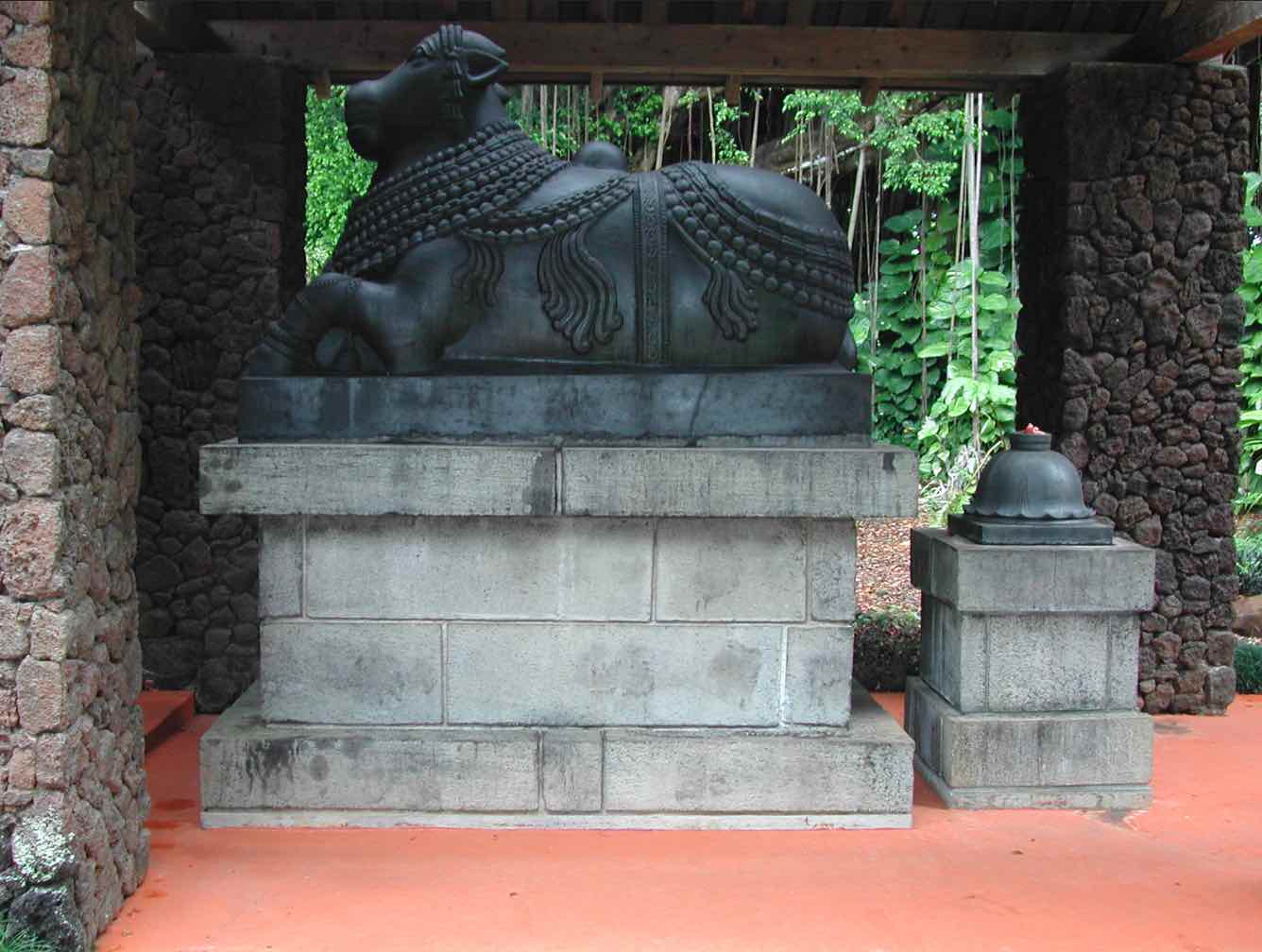
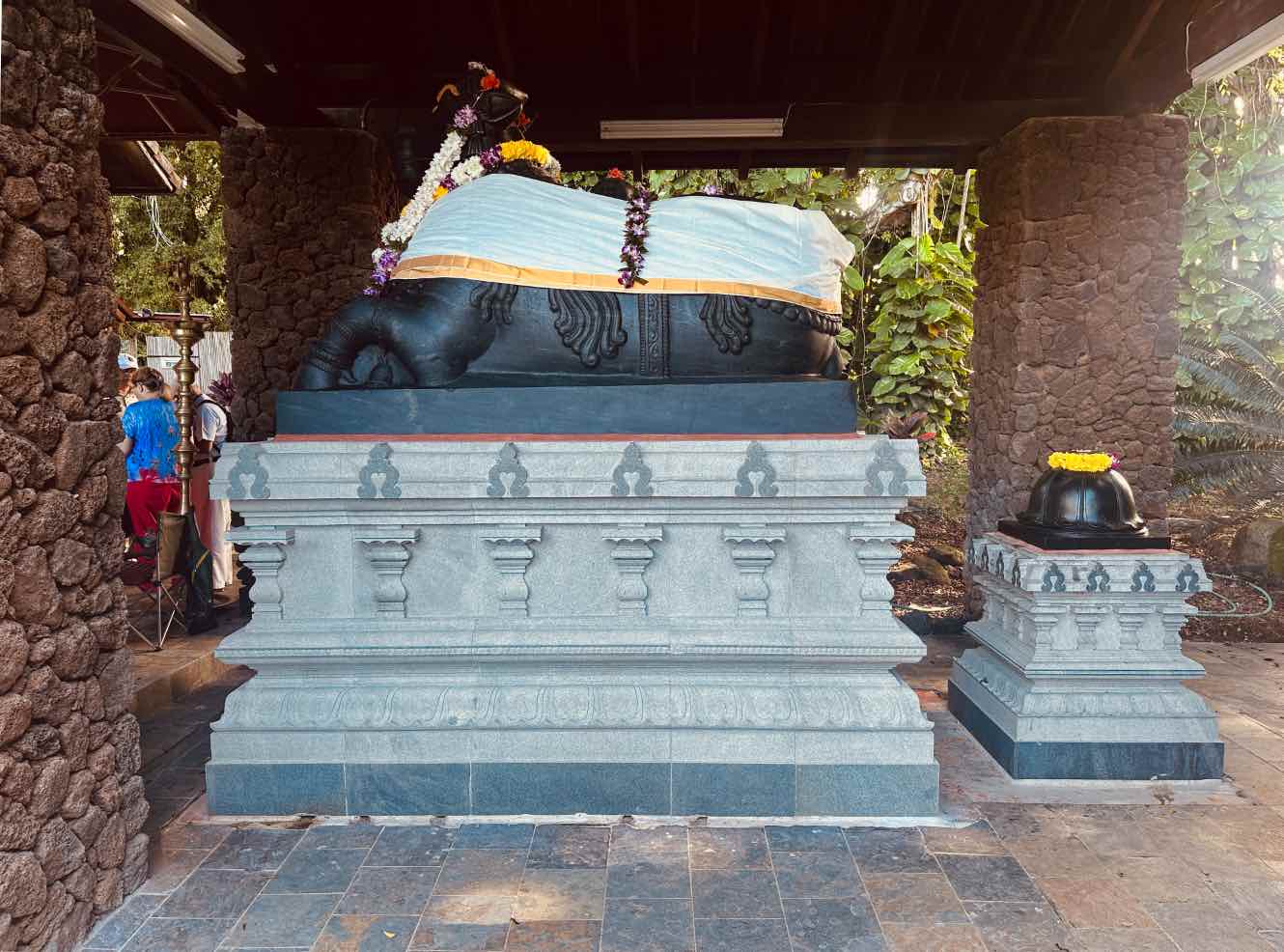
Ganesha and Muruga Cleaning
Our Postulant Monastics Renew Their Vows
In our monastic order, a monk can only take lifetime vows once he becomes a sannyasin. Until then he is under short term vows that must be renewed every two years on the auspicious occasion of Guru Purnima. He is known as a "Postulant" monastic. Some days ago our postulants all gathered in the Guru Temple to renew their four vows of Humility, Purity, Obedience and Confidence. Below are the introductions to each vow.
HUMILITY IS THE STATE OF profound maturity in which the soul, immersed in the depths of understanding and compassion, radiates the qualities of mildness, modesty, reverent obeisance and unpretentiousness. There is an analogy in the Saivite tradition that compares the unfolding soul to wheat. When young and growing, the stalks of wheat stand tall and proud, but when mature their heads bend low under the weight of the grains they yield. Similarly, man is self-assertive, arrogant and vain only in the early stages of his spiritual growth. As he matures and yields the harvest of divine knowledge, he too bends his head. In the Tamil language this absence of pride or self-assertion is known as pannivu. Pannivu also means "jewel." In the Tirukural it is said that "Humility and pleasant words are the jewels that adorn a man; there are none other."
PURITY IS THE PRISTINE and natural state of the soul. It is not something which the monastic attains as much as that which he already is, and which becomes evident as the layers of adulterating experience and beclouding conceptions are dissipated. Purity is clarity and clearness in all dimensions of being. It is innocence as opposed to familiarity with the ways of the world. It is for monastics the observance of chastity, called brahmacharya. In Tamil purity is given its fullest expression in the term tirikarannasutti, which means "purity in mind, speech and body." These three--also called thought, word and deed--convey the fullness of the ideal of purity.
OBEDIENCE IS THE STATE OF willingness and cooperation in which the soul remains open and amenable to enlightened direction. For the monastic it is an unbroken pledge of trust in and surrender to the satguru, the guru parampara and the mystic process of spiritual evolution. In the Tamil language this definition of obedience is expressed in the term taalvu enum tanmai, which denotes "the quality or state of humble submission." Obedience does not consist in blind submission and yielding to authority, nor in weakening our own will that it may be dominated by the will of another. Yet it is, in another sense, submission to a sacred purpose and the divine authority of the Second and Third Worlds. It is, for the monastic, an inner quality that allows him to remain consciously tractable and responsive.
CONFIDENCE IS THE STATE of trust in which the sacred teachings and sensitive or personal matters are not divulged to others. Spiritual matters must be protected and preserved by those to whom they are entrusted, never wantonly or indiscriminately revealed. When we confide in another, we do so with the assurance that sensitive and serious information will not be inappropriately disclosed. In the Tamil language confidence is known as rahasiyam, meaning "secret or mystery." Confidence as applied to these Sacred Vows does not mean "certainty," "a belief in one's abilities" or "self-confidence." Rather it is a confiding, a trusting and a relying upon. It is the controlled sharing of privileged teachings or information that should not be disclosed, but held in confidentiality. In its most simple form it is the keeping of a secret. Confidence for the monastic may be defined as wisdom in handling information.
A New Monk Is Born, Sannyasin Tillainathaswami!
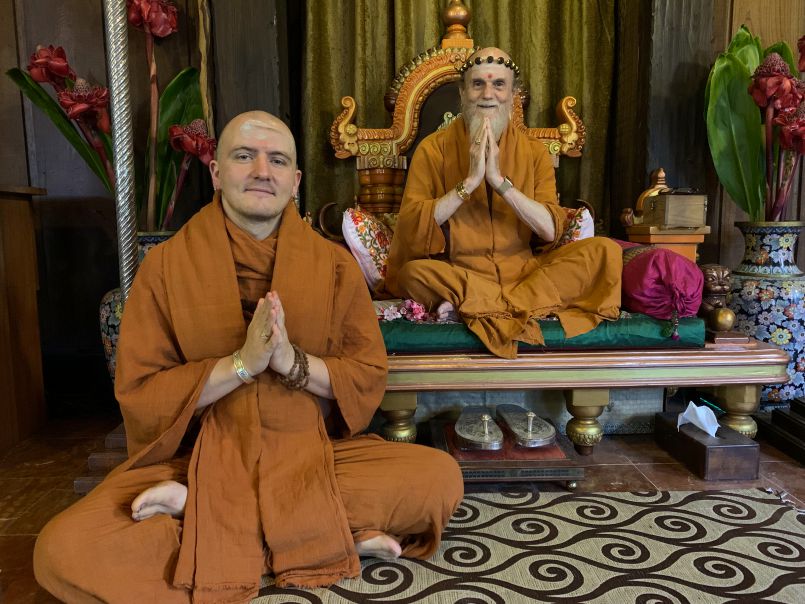
Today is the holy celebration of Vaikasi Visakam, honoring the birth of Lord Murugan. On this day the Saiva Siddhanta Yoga Order welcomed its newest swami in traditional ritual.
Thus was born Sannyasin Tillainathaswami!
Together at dawn and in the presence of all the swamis of the Order, he and the satguru symbolically conduct his antyesti samskara, the ritual funeral rites, to betoken the death of the personal self and the birth of the spiritual being. He places the remnants of personal identity, clothing, pulnool or sacred thread and all desires for wealth, progeny and fame into the homa fire, beseeching the permission of Lord Ganesha and heeding the path of Lord Muruga, vowing aloud his renunciation thus: "All that I have and all that I am I now give unto my God, my Gods and my guru. I have no family except the Divine Father Siva and Mother Sakti who dwell in Kailas and on Earth the sangam of Saivite devotees. I have no home except the stillness of Being. I have no possessions except my faith and dedication. I have no desires except my desire to serve and to realize God." The candidate then says aloud three times, "I, wishing for mukti, take refuge in this sacred Order and in God Siva, who created the world, who breathed out the Vedas. The purpose of my life is to cultivate dispassion, to become pure, to attain union with God Siva and be immersed in Divine Love. I do fully and of my own volition accept these Holy Orders of Sannyas, now and for the remainder of my life, and bind myself in the fulfillment thereof to the ancient Order of sannyas, to my satguru, to my Saivite Hindu faith and to the devas, the Mahadevas and Lord Siva Himself. I am the Atman, the non-dual Parasiva, pure and free."
So saying, the renunciate walks seven steps around the homa fire, returning to kneel at the guru's feet. He is thereafter dead to the world. The satguru then whispers the Panchakshara Mantra in the candidate's right ear three times, along with personal instructions for meditation.
The acharyas read aloud Yogaswami's from Natchintanai:
Hail, O sannyasin, love's embodiment!
Does any power exist apart from love?
Diffuse thyself throughout the happy world.
Let painful maya cease and ne'er return!
Day and night give praise unto the Lord.
Pour forth a stream of songs
To melt the very stones.
Attain the sight where night is not nor day.
See Siva everywhere, and rest in bliss.
Live without interest in worldly gain.
Here, as thou hast ever been, remain.
Then never will cruel sorrow venture nigh.
THE SACRED VOW OF RENUNCIATION: KNOWN IN TAMIL ASAHATTURAVU.
RENUNCIATION IS THE RELINQUISHMENT of world, desire and ego. It is detachment founded in knowledge of the magnetic nature of body, mind and emotion, a knowledge which inclines the soul toward non-involvement with external forms and, in time, summons forth realization of Parasiva, Absolute Reality. Renunciation is repudiation of individual personality and ownership. It is poverty as opposed to affluence, simplicity as opposed to ramification in life. It is self-containment, freedom from worldliness and its concomitant distractions and obligations. In its deeper sense, renunciation is a surrendering of limited identity, ego-sense or individuality known in Sanskrit asahamkara, that the soul may soar to the very depths of Being. It is the beginning of the end of samsara, the wheel of rebirths, the death of the old ushering in a spiritual renascence which will ultimately mature into illumination andmoksha. It is the ultimate ripeness of the soul and mystic marriage to God Siva. It is the Maha Vrata or Great Oath of the Saivite pathfinders and contains within it commitment to the unwritten and even unspoken customs followed by those who have worn thekavifor untold centuries.
In Tamil renunciation for the sannyasin is known asahatturavu, which means "detachment through giving up the sense of I' and mine,'" epitomizing the ideal of this Sacred Vow. Renunciation is not a running away from the world provoked by fear or failure therein. Rather it is an irrepressible drawing into sacred realms of consciousness and being far more subtle and demanding of discipline than anything the world may offer--a state of being that follows fulfillment in the world as the next natural evolution of consciousness. Renunciation is not an opportunity to shun responsibility or to do as one pleases, but carries with it challenges and accountability of an even more formidable, albeit inner, nature. It is not a disgust for this world, but a love of deeper worlds so great that the material universe and its gifts are, by comparison, mean and meager. Though he strives to be affectionately detached, the sannyasin should never become indifferent or so accepting of all that happens that he accepts passively harm to himself, his Order or his religion. The renunciate's life is not one of inactivity, but vital activity directed toward selfless and spiritual ends--an inner consciousness described in scriptures as the giving up not of work but the fruits thereof, whether apparently good or bad. It is not by virtuous acts that the sannyasin attains liberation. They are chains, though wrought in gold. No deed, however altruistic, is without its bearing on the ego of the doer; and thus the sannyasin holds firmly to his detachment even in the midst of his bountiful benevolence.
Renunciation is the abjuration of the grihastha dharma and the acceptance of the sannyasa dharma, a dharma which will create or resolve karmas according to how it is discharged. Though it disallows personal possessions and upholds the ideals of simplicity known as poverty, renunciation is not a condition of destitution, deprivation or disregard for one's well-being. Nor is it a resignation from life or an abandoning of humanity, but a fulfilling of mankind's highest need and a joyous surrender to That which is the substratum of life. It serves not man, but God in man, not the body but the spirit within the body. Renunciation for the sannyasin may be defined as wisdom in handling of karma, maya and desire. He must strive to free the mind from the thralldom of the senses. He must work diligently to extirpate vanity and selfishness, realizing that the ego, though subdued by the strength of tapas well performed, is never annihilated as long as the soul remains embodied, but is subdued, reserving the potential to rise again should he abandon his sannyas dharma. He must strive, especially at the outset, to quell the forces of pride, pretention and conceit, never allowing himself to feel the flush of self-importance or arrogance. He must guard his modesty as a treasure, never holding himself superior to others, for there is no conceit so tenacious as the spiritual ego. Before he is well-grounded and stable in his realization, he must give up all siddhis that may arise as a natural consequence of his sadhana and unfoldment, neither desiring nor encouraging such powers. He must see the perfection resident within the souls of all men, but remain aware of his own faults and transgressions, however insignificant. He must remain equally indifferent to both praise and blame, never allowing others to extol his virtues, never speaking personally of himself or his past, even when asked. He must never accept personal gifts, however small or well intended. However, he may accept food and minimal travel assistance and receive non-personal contributions on behalf of the monastery, placing them immediately upon the altar, offered to the Lord.
The sannyasin cultivates renunciation through meditation on the transcendent Parasiva and worship of the immanent Lord Hara who removes the fetters which bind the soul. He cultivates renunciation through remaining secure within his inner consciousness and radiating the joy and contentment which are the harbingers of awakening. He cultivates renunciation through living simply, holding the consciousness that Lord Siva has entrusted to him the care of tools and personal items which he uses; such an attitude of custodianship averts any sense of possessiveness. He cultivates renunciation through patiently enduring hardship. He cultivates renunciation through performance of tapas and austerities which keep his will strong and his ego subdued. He abjures personal wants that may arise rather than seeking to fulfill them and casts off all preferences, both likes and dislikes. He accepts in trustful love all that comes, offering no complaint when ostensible needs are not provided. He practices detachment and dispassion, vairagya, consciously remaining calm, kind and quietly strong in the midst of even adverse circumstances. He cultivates renunciation by continued penetration into contemplative states of mind, withdrawing from the vortex of external consciousness into Parasiva, the Self God. He cultivates renunciation by surrendering to the will of Siva in his life, abiding in the knowledge of Sarvam Sivamayam, all is Siva, a mystic insight which will dissolve all concepts of separateness from God and offer in its stead cognition that jiva is indeed Siva. He cultivates renunciation through living on the eve of his departure, always ready to change, to move, to travel wherever he may be needed. He cultivates renunciation through not identifying with name and form, through not attaching importance to title or position. He cultivates renunciation through detachment which evolves from viveka which is discrimination to vairagya which is dispassion to tyaga which is renunciation and finally into kaivalya which is emancipation, blissful independence and moksha. He cultivates renunciation through giving up all fears of death and even desires of anticipated enjoyments of the heavenly realms. He cultivates renunciation through viewing himself as the homeless one, free and unattached, finding security within the recesses of his own being, not participating in the mundane concerns and conversations of the world, nor engaging himself in social life outside of the brotherhood of sannyasins. He cultivates renunciation through non-involvement with his family or former friends. He cultivates renunciation through remembering that this body is destined to perish, that this personality is fleeting, and identifying therefore with nothing ephemeral, but with the only permanence there is--That within which lies beyond time, form and cause. He cultivates renunciation through spurning the life that is death and embracing the death that is life eternal, transcending himself by himself.
In fulfillment of his Sacred Vow of Renunciation, the sannyasin is directed to not involve himself in matters of the world. Should worldly situations arise, whether from within the monastery or without, he is enjoined to remain silent and aloof. Neither shrinking from disturbed conditions nor feeding them by his thought and concern, he must remain ever the witness lest he hasten the harvest of such unseemly karmas. He is enjoined to keep his own personal needs moderate while not requiring the same of others and to hold firmly to his yoga and his equanimity. If he can remain the silent watcher, if he can control the wanderings of the mind sufficiently to be summa, to just be, if he can remain joyous and serene in all circumstances, if he can progressively surrender the sense of "I am the doer" and awaken the perception that "Siva does all," if he can patiently endure all hardship and maintain his tavam, standing apart from the entanglements of sex, money, food and clothes, if he can live in simplicity owning nothing in this world, not even the robes he wears, if he can never, never forget his guru and the goals of service and realization, he will have fulfilled the spirit of this Sacred Vow. May the sannyasin ever call to mind the words of the Tirukural,"Attach yourself to Him who is free from all attachments. Bind yourself to that bond in order that all other bonds may be broken."
Bringing Forth Our Saivite Scriptures

Aum Namah Sivaya
Today we'd like to announce the release of our latest Web App, which works to fulfill one of Gurudeva's long-standing ideas of a concise collection of our most revered Saiva Siddhanta scriptures.
So click here to view these acred Scriptures of the Saivite Hindu Religion. This online anthology includes english translations of some of our most important and profound texts, with more to come! It includes excerpts from the Vedic Hyms, the Upanishads, the Kamika, Raurava, Sarvajnanottara and Mrugendra Agamas, the Sri Nandikesa Kasika, Patanjali's Yoga Sutras, the Tirumurai and more. Dive in and start discovering what your scriptures are really about. Aum.
There Is Only Now
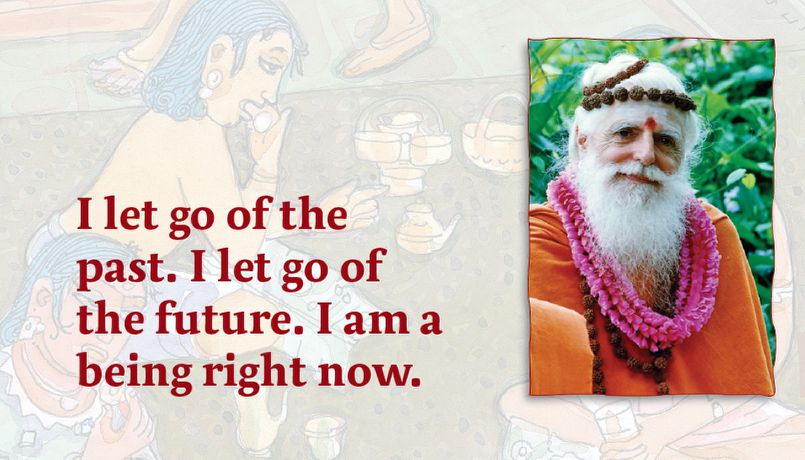
This is our final day of Gurudeva Affirmations. He is like a doctor, with natural prescriptions to heal body, mind and emotions.
"How Do We Use Affirmations?
"An affirmation is a positive declaration or assertion that we repeat regularly to bring about useful changes in our life. While repeating the words, we concentrate on the meaning and visualize and feel the desired result. Your words, visualizations and feelings have power.
They impress your subconscious mind. When they are positive, useful and creative, they make you more secure and successful in everything you do. Affirmations must be carefully worded to gain the desired effect. The sadhana is to repeat it to yourself for a minute or two, ideally at the same time each day. Silently is good, but aloud is even better. For example, 'I can. I will. I am able to accomplish what I plan.' Repeating this each day programs your mind with confidence and increases your willpower. But just saying the words is not enough. You must feel 'I can! I will! I am able!' Imagine what it will feel like when you accomplish your goal. It is helpful to remember the feeling of success you experienced when you achieved something in the past. Positive affirmations help you face life with optimism. Negative thinking does the opposite.
Many people think, 'I can't. I won't. I'm not able.' And, sure enough, they fail. Why? Because they have programmed their mind to fail. An affirmation creates the opposite effect. You see the goal clearly and feel yourself attaining it. Success follows naturally. Gurudeva's other affirmations include 'I'm all right, right now,' 'All my needs will always be met,' and 'I am equal to any challenge I meet.' Affirmation builds a positive self concept. This means knowing that you are a worthy person deserving a wonderful life and fully capable of achieving it. Having such a positive concept allows us to identify with our inner, spiritual nature so that we truly feel we are a divine being on a perfect path."
Then we have Gurudeva's quote here: "Get into the rhythm of the affirmation. This causes strong feelings and impressions deep in the inner mind. Each word has a certain rate of vibration. Feeling is greater than visualization."
Four More Affirmations for a Positive Life
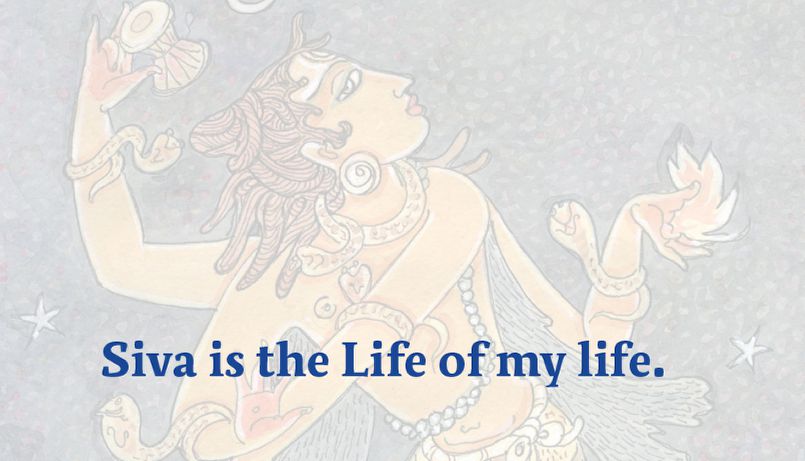
Today's affirmations from Gurudeva speak of our innate divinity and how we can learn from any experience, as long as we remain alert to the possibility.
A Few Stories from Around the World
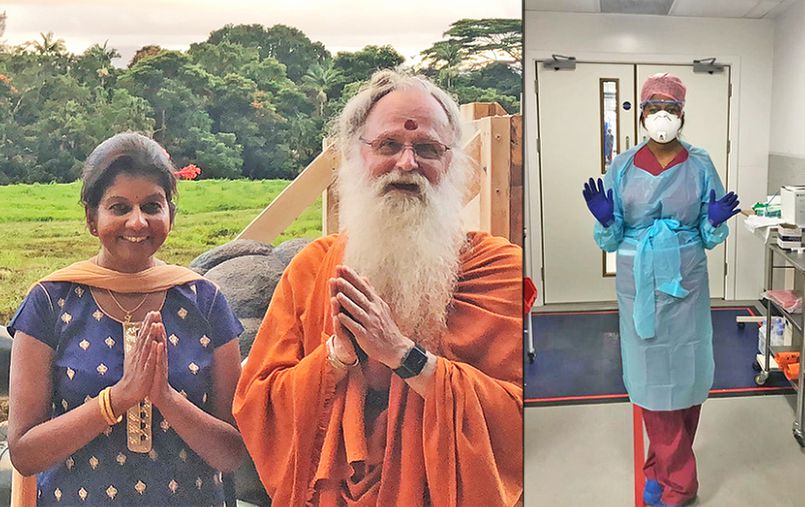
Keeping Positive in an Ocean of Negativity

As the world faces the pandemic, as cities and nations close their borders, as families hunker down in their homes, Gurudeva's wonderful vision of the cosmos can serve as a life raft.
Four more of his affirmations are offered today. They speak of identity and of loving sharing.
From Our Gurus' Teachings
Archives are now available through 2001. Light colored days have no posts. 1998-2001 coming later.
